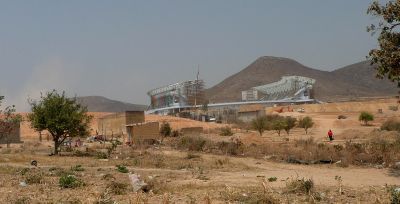Angola hopes 2010 Nations Cup will kick start tourism

With a good climate, expansive deserted beaches, striking Portuguese architecture and excellent bird watching, fishing and surfing, Angola has plenty to offer tourists.
Since the end of civil war nearly eight years ago, the oil-rich country has spent billions of dollars rebuilding and hopes that hosting the Africa Cup of Nations (CAN) in January will kick-start a lucrative tourism industry.
Around 25 new hotels and guesthouses have been built in the four host cities of Luanda, Cabinda, Lubango and Benguela, and the government is giving out glossy brochures of the country's attractions.
"Angola has a lot of tourism potential," tourism ministry spokeswoman Rosa Cruz told AFP.
"We have hopes that in the coming years we're going to become like South Africa, Mozambique and Kenya which have lots of visitors.
"We lived through 30 years of war and that means very few people came here, but now we've been living nearly eight years in peace and the country is growing and developing."
But how ready is Angola for mass tourism?
With fewer than 100 hotels countrywide in 2008, Angola still battles a lasting legacy of landmines, problems with water and energy supplies, and desperate poverty afflicting two thirds of the population.
English is not widely spoken, there are no private taxis, and foreign visitors are still a novelty in the interior.
"Angola is not a holiday destination for beginners," reads the first English-language guide dedicated to Angola.
However, the guide, which speaks enthusiastically about the country's potential, adds: "Angola is keen to regain lost time and things are changing incredibly fast - travellers shouldn't waste another minute if they're keen to see its raw beauty."
Rafael Loureiro, an Angolan who runs a bed and breakfast from his farm in the mountainous Huila province agrees.
"There is so much to see here, from beaches to mountains to waterfalls, here in Lubango we have our own Cristo Rei, like the ones in Brazil and Portugal," he told AFP.
"Because of the war people do not know about Angola, but sometimes that sense of the unknown adds to the excitement.
"I think CAN will bring lots of people here and I hope so, because when you have tourism, it brings money and that money helps develop the country."
Paul Wesson is a partner at Luanda-based Eco-Tur travel agency. He specialises in trips for the many expatriates based here, but says foreign bookings are starting to increase.
"Angola has obviously had a very turbulent 30 or 40 years but it's through that now, and I think it's a very exciting destination for pioneers," he said.
"It's got a lot to offer: a fantastic climate, beautiful scenery, ranging from desert in the extreme south to jungle in the extreme north, through to savannah and then there is an alpine region in the centre running north-south, so it's hugely varied."
High costs however, according to Wesson can put people off. Flights from Europe, which are often block-booked months in advance by oil and construction companies, start at 1,000 dollars for CAN.
Hotel rooms, also in high demand, range from 250 dollars a night for something basic to 450 dollars a night for something decent. A meal out for two will easily set you back 100 dollars.
"Luanda is the most expensive city in the world because of the issue of supply and demand, which raises prices," Wesson said.
"Because the war destroyed pretty much all local production, everything has to be imported and the supply chain costs are enormous."
Visas, he added, were another hurdle in terms of red tape, but he said the process was improving.
For CAN the government promises to make visa applications simpler and says all Angolan embassies have been told to facilitate sports fans wanting to visit.
Jim Louth, who runs Britain-based Undiscovered Destinations, has been taking tours to Angola for three years.
"There is more to Angola than war and landmines," he said. "Those who visit will find wonderful people and experiences."
But he added: "I do have to tell people that high prices don't always mean high quality and that the tourism sector in Angola still needs a lot of work."
lr/gs/dj/pi09
Subscribe to Independent Premium to bookmark this article
Want to bookmark your favourite articles and stories to read or reference later? Start your Independent Premium subscription today.

Join our commenting forum
Join thought-provoking conversations, follow other Independent readers and see their replies
Comments